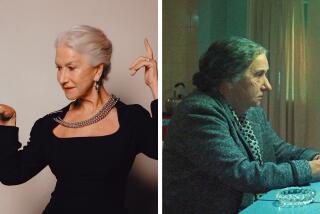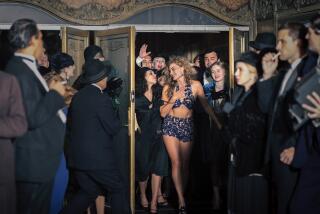Television Reviews : Looking Back at Cinematic History With Lillian Gish
- Share via
Only Lillian Gish could make lewd into a three-syllable word, which she does enchantingly in “Lillian Gish: The Actor’s Life for Me,” airing tonight at 9 on KCET Channel 28.
Gish had been cast as Ophelia to John Gielgud’s Hamlet on Broadway and her first thought was “Oh, another ga-ga baby.” But director Guthrie McClintock said, “It’s going to be a lewd Ophelia.” Gish says, “I thought, how wonderful. I’d never heard of a lewd Ophelia.”
Her Ophelia was not lewd enough to make history, but Gish has made sufficient history anyway. She made her stage debut before the Wright brothers flew. She was five in 1902 (she will be 92 in October by most reckonings) when she appeared with a road company in Rising Sun, Ohio.
With her mother and her sister, Dorothy, she was soon touring in melodramas 40 weeks a year, playing hide and seek with the child labor laws, particularly around Chicago where enforcement was rigorous.
Early on she and Dorothy were billed under false names, as Baby Alice or Baby Delores, to avoid shaming the family, the stage not being a place where decent folk worked.
In New York, they went one fateful day to call on a stage friend named Gladys Smith, who was working in the movies (regarded as an even lower fate than the theater) for D. W. Griffith. Gladys, it turned out, had become Mary Pickford. Griffith put the visitors to work as extras and so began an extraordinary association.
The documentary, which launches a new series of portraits in the “American Masters” series, was produced and directed by Terry Sanders, with the narration spoken by Eva Marie Saint.
There is a lengthy interview with Gish at her most beguiling, interspersed with some unfamiliar footage of Griffith himself at work and with ample clips from “The Birth of a Nation,” “Intolerance,” “Way Down East,” “Broken Blossoms” and a one-reeler, “Unseen Enemy” (1912) that may be the earliest glimpse of Gish on film.
The ice-floe sequence from “Way Down East,” Gish awash in the icy water, Richard Barthelmess leaping across the ice-cakes to save her from certain death in the falls, is still breathtaking in its unfaked realism. “Dick Barthelmess said, ‘There isn’t enough money in the world to make me do that again,’ ” she remembers.
“We worked 12 hours a day, seven days a week, and we liked it because it was so interesting,” Gish says.
When her days with Griffith ended (with “Orphans of the Storm” in 1922) she went West to MGM, where Louis B. Mayer embraced her as the star who started his fortune. (He had pawned his wife’s wedding ring to rent “The Birth of a Nation” for his New England theaters.)
She produced and starred in several films, including “La Boheme” and “The Wind,” from which an amazing sequence is shown on the program.
There has surely been no longer career in American acting; she now, with “The Whales of August” in 1987, spans more than three-quarters of a century and, on the evidence of the interview, remains precise of mind, lively and independent of spirit, a woman of talent and dignity to whom Sanders’ documentary does full justice.
More to Read
The complete guide to home viewing
Get Screen Gab for everything about the TV shows and streaming movies everyone’s talking about.
You may occasionally receive promotional content from the Los Angeles Times.






